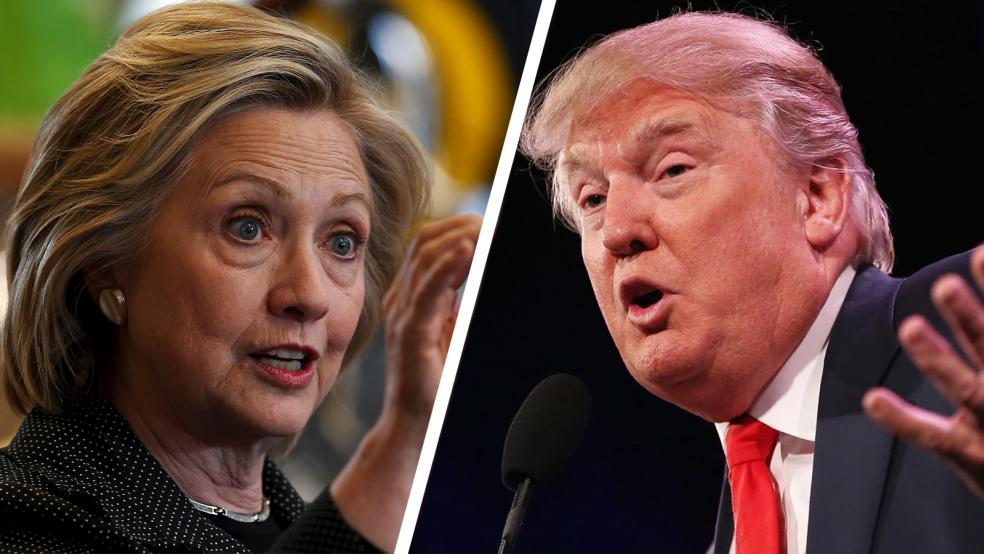Quick. What’s the first thing that springs to mind when you think of former Secretary of State Hillary Clinton?
According to a new national survey by Gallup of Americans in both parties, the most common responses are “Dishonest” or “liar” or “don’t trust her” or even “belongs in jail.” Ouch.
Related: Trump and Rubio Gang Up on Ted Cruz
Clinton’s chief rival for the Democratic presidential nomination, Sen. Bernie Sanders of Vermont, fairs much better on the honesty and integrity front. Yet the 74-year-old politician still evokes initial comments that should give him pause in reaching out to a larger audience: “Socialist” and “Communist,” “older,” and “crazy/delusional/idiot/unrealistic.”
The 2016 presidential campaign may go down as one of the most negative of modern times, with the Democratic frontrunner Clinton running under a black cloud of public suspicion and disdain for her mishandling of sensitive emails during her four years at the State Department and her response to the 2012 Benghazi, Libya, terrorist attack on a U.S. diplomatic compound, while the likely Republican nominee, Donald Trump, has blistered Democratic and Republican candidates alike with charges of lying, incompetence, low energy and even criminality.
Clinton has consistently drawn high negative ratings for her character and honesty since she formally launched her campaign for president last spring. Trump has engendered far more pessimism and negativity among voters across political and ideological lines, even as he continues to rack up impressive showings in the early primaries and caucuses – and is likely to win again in Tuesday’s Republican caucuses in Nevada.
While a minority of Americans say they admire his business background, blunt talk and harsh views on immigration, according to another Gallup survey conducted in January, more than 40 percent could not think of anything positive to say about a potential Trump presidency. And Americans’ list of negatives about Trump largely focused on the combative billionaire’s obnoxious personality – including generalized feelings that he is arrogant, offensive and rude, ill-tempered, hot-headed and “stupid and idiotic.”
Related: With South Carolina in Hand, Trump Continues His War with the GOP
In an odd example of political jujitsu, there appears to be an inverse relationship between a candidate’s approval ratings and standing in the early primary contests – working to the advantage of Clinton and Trump. A new poll conducted Feb 11-17 by McLaughlin & Associates, a conservative organization, concluded that both political parties’ presumed front-runners are disliked by the majority of Americans.
In the case of Clinton, the former first lady and New York senator drew negative ratings from six in ten voters surveyed, with her highest-ever unfavorable rating of 59 percent while just 38 percent were favorable. (Among Democrats alone, not surprisingly, she does much better, with 72 percent favorable an only 26 percent unfavorable. But her negative ratings shoot up significantly among independents, with 65 percent of them saying they are highly critical of her candidacy.)
Yet Trump is even more unpopular than Clinton is among all voters, with 62 percent giving him an unfavorable rating and just 35 percent saying nice things about him. Trump – who acknowledged in his victory speech in South Carolina last weekend that his personality was a problem – received a 57 percent favorability rating from rank-and-file Republicans.
Related: Rubio, the Unlikely Establishment Candidate, Is Now Trump’s Main Rival
That still leaves 41 percent of Republicans who have problems with his candidacy. And self-described conservative Republicans have a slightly less positive view of Trump than others do in the party. That reflects the considerably higher approval ratings claimed by Sens. Marco Rubio of Florida and Ted Cruz of Texas, Trump’s two remaining serious Republican challengers.
The new Gallup survey of Americans’ “top-of-the-mind” impressions of Clinton and Sanders suggests that both candidates have their work cut out for them in bringing more voters to their side. While 21 percent of respondents complained that Clinton was dishonest or not trustworthy, another 7 percent used much harsher language, including “criminal” and even a “thief.”
She has been dogged throughout the campaign by criticisms of her close ties to Wall Street, the tens of millions of dollars that she and her husband, former President Bill Clinton have accepted in speaking fees from special interest groups and universities, and her mishandling of secret documents on her personal email server during her four years as secretary of state.
Related: It’s Clinton vs. Trump Unless More GOP Drop-Outs Change the Balance
Sanders, meanwhile, is considered more honest and caring about the needs of average Americans, and a “fresh face” in the national political arena despite his decades of service in the House and Senate. Yet clearly many Americans (12 percent of the respondents) are focusing on his background as a socialist (for good or ill) and his advanced age.
And many doubt his grandiose and costly plans for a national health insurance program, free college tuition for all, trillions of dollars in tax increases on the rich and Wall Street and other proposals that some Americans described as “crazy” or “delusional.” These concerns go to the heart of Clinton’s criticism of Sanders that he is not a pragmatic or realistic politician and that most of his proposals are political pie in the sky.





